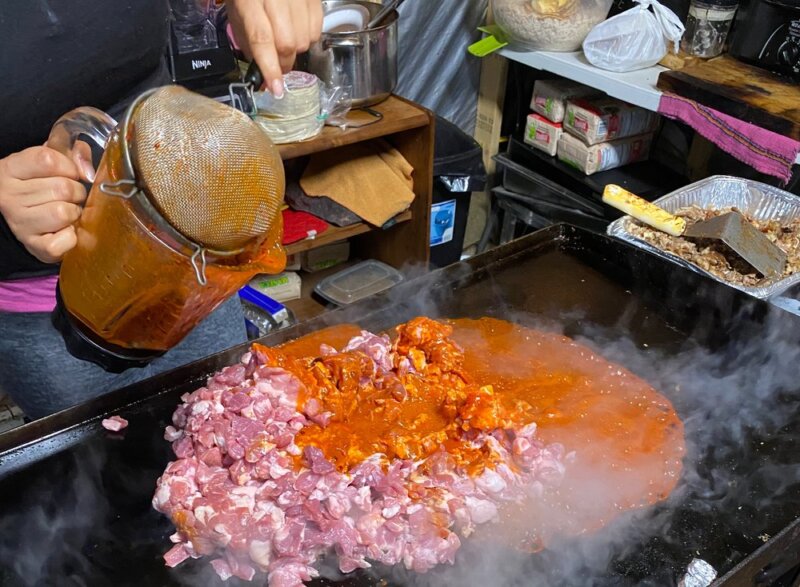At Tacos Doña Alejandra, a migrant cooks up community
(Editor’s note: Quotes from Perez and Verduzco have been translated from Spanish by the author, who is fluent.)
When Alejandra Perez arrived from Mexico in Vermont 14 years ago, she found it difficult to engage with her new community. Migrant women like her can feel lost, alone and in need of support so far from home.

Tamales and carne al pastor cooking on a flattop grill at Tacos Doña Alejandra.
So in 2010 she decided to build her own community — by cooking and selling authentic Mexican food outside her home. She’s open for guests every Sunday for breakfast and lunch.
She spoke about her business, Tacos Doña Alejandra, on a recent afternoon over a bowl of pozole and two chicken tacos, dressed with homemade spicy sauce and fresh vegetables. There were children everywhere, playing with each other in English and Spanish. Two women who work for Perez chatted while looking through a bin of donated clothes. Perez asked if one of them would take care of new customers while she recounted the story of her shop.
The idea for her business began several years ago when she noticed migrant farmworkers in the area had no time to cook after working long shifts. Over the years, the workers, Middlebury College students and people from all over Addison County have learned about her business through word of mouth and become regulars. Her recipes take inspiration from her family back in Mexico and the farmworkers who encouraged her to start the business in the first place.
Mari Verduzco, another Mexican cook from Salisbury and good friend of Perez, gushes about how much comfort her space has brought to the migrant community. “It feels like a taquería in Mexico,” she said emphatically. “You get there, introduce yourself and get to know new friends, just like in Mexico. You can sit next to a total stranger and by the time you leave, you feel like cousins.”
To Perez, it means a lot to feed Mexican-American students in particular: “It’s amazing to stand at this door and watch people arrive from the college, and they all give me a hug … I always do it from the heart. I hope that one day my children, wherever they end up, find someone who speaks Spanish or can cook Mexican food.”
Despite the language barrier — Perez speaks Spanish — the majority of her customers are Vermont natives. She can offer them a relatively rare culinary experience in Bridport, a town of about 1,200 residents, complete with imported drinks, snacks and desserts.
“A piece of Mexico in Bridport” was how Fernanda Canales, a retired principal who works as the multilingual liaison for Addison County School District, described Tacos Doña Alejandra. She met Perez when the latter volunteered for the school district’s Strategic Planning Advisory Committee, and Canales translated for her.
Canales, a fellow Latina immigrant, said she relates to the feeling of isolation that can come with trying to assimilate into U.S. culture. Canales’ work at the school district for immigrant families felt to her like “a homecoming.” Perez describes something similar about her work: The community she feeds has become a family, she said, substituting for the one she misses in Mexico.
Oftentimes the migrant community can seem invisible to outsiders, and representation in the school district is crucial, the three women said. “The fact that she wanted to participate was huge,” Canales said of Perez. “And she did, faithfully, (go) to all the meetings. At the very last meeting she cooked for everybody.”
Verduzco, the Mexican cook and regular at the food spot, said that Perez’ meals allow for people from different cultures to connect. “It’s very important that Mexicans and English-speaking Americans come together to understand how each other live,” she said.
Perez became a mother shortly after moving to the United States, first to North Carolina, then to Vermont soon after. She needed to work to support her family, she said, but could not afford child care. After having sold tacos to farmworkers, she realized the freedom she could have working for herself at home. “I can cook, go to events, make money and always have my children by my side,” she said. She decided to keep her business running outside her house on Lover’s Lane in Bridport.
She also now works alongside other migrant women in a culinary collective called Viva el Sabor, which acts as something of a support group between food business workers.
Perez’ space has grown from a converted shed to include a tent with picnic tables and brightly colored decorations. She cooks right in front of customers after greeting them individually.
“It has such a flavor of México,” Canales said. “The music, the decorations, all the food … even the chickens!”
That’s exactly the kind of space Perez wants. She said that if she were to host her business in a more traditional restaurant setting, it might lose the accessibility of her outdoor eating space.
“It’s nice to go out to eat in a place with air conditioning, but I don’t want that,” she said. “I want an appropriate space to receive my customers, not a place where someone might say, ‘Oh, that’s so fancy, our boots are too dirty to go in.’ People come here straight from their jobs at the cow farms just to eat.”
(The Community News Service works in a partnership with The Charlotte News and other local media outlets to provide opportunities to University of Vermont students.)


